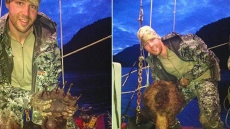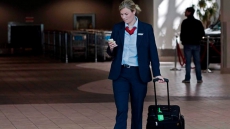MCBRIDE, B.C. — Five snowmobilers died Friday in a major avalanche near the interior community of McBride, B.C., which came as "heartbreaking news" to the snowmobiling community and local officials.
The slide happened in the Renshaw area east of McBride, which is about 210 kilometres southeast of Prince George. RCMP said three separate groups of snowmobilers were in the area at the time.
Mounties said they were first notified after the activations of two separate GPS beacons, which are carried by backcountry enthusiasts in case of emergency. The Robson Valley Search and Rescue Team was immediately activated.
One helicopter was dispatched, and two search and rescue technicians were on scene almost immediately as they were snowmobiling in the area just before the slide, said Cpl. Dan Moskaluk.
"They quickly determined there were several persons that were buried," he said. "Unfortunately, five snowmobilers are deceased as a result of the avalanche. Their remains have been recovered from the avalanche area."
Throughout the afternoon and evening, rescue crews and paramedics helped to remove people from the area and tend to the injured, he said.
Three ground ambulances were sent to the scene and one person was transported to hospital in stable condition, the B.C. Ambulance Service said.

Authorities weren't able to confirm Friday night that everyone had been accounted for. Local RCMP were visiting motels and making inquiries in the community to see if anyone was missing, Moskaluk said.
At least eight snowmobiles were buried in the slide, he added
The B.C. Coroners Service said two coroners had been dispatched from Prince George, B.C.
Rick Thompson, a councillor with the Village of McBride, described the area on Mount Renshaw as a popular sledding area about 15 kilometres from the townsite and said the news came as a shock.
"It's devastating. As soon as you hear about something this tragic, you immediately begin to think about all your friends and family that you know, and the acquaintances you do know who may be out there sledding," he said.
"I was out at Chinese dinner this evening when the news broke, and it was, like, 'oh my God, who was out there?'"

Thompson said a contributing factor was doubtless the weather, which he described as "not terrific."
"We had a great amount of rain down in the valley early in the week, which meant there was a lot of fresh snow, about three feet I heard, up on the mountain. It's been hot and cold, which creates poor conditions, so avalanche conditions are high."
The news prompted an outpouring of condolences from avid snowmobilers.
"This is truly heartbreaking news," a member of a snowmobiling community forum wrote. "It feels, when hearing news of other snowmobilers passing, like losing a family member. Never met these folks, but I am sad to have lost them."
Karl Klassen of Avalanche Canada said the "very large, significant" avalanche appears to be human-triggered, but he did not elaborate.
He said rain and snow over the last few days followed by clearing and cooling on Friday may have produced stresses in the snowpack.

Jobs and Tourism Minister Shirley Bond, who has been the MLA for Prince George-Valemount for 15 years, issued a statement on behalf of the B.C. government.
"This avalanche and the resulting loss of life is devastating news and our thoughts and prayers are with those who have lost a loved one," she said.
Bond also praised the emergency responders involved in dealing with the tragedy.
"I appreciate their courage and skill in the search and recovery process. It is a very sad day for all of us.”
Two men were also killed in the McBride area in March 2015.
They were part of a group of four Albertans who had been snowmobiling in the Dore River Basin near the community.
Curtis Fries, 36, of Sherwood Park, Alta., was dug out of the snow and his fellow riders tried to perform CPR on him but he died at the scene. Thomas Hamilton, 29, of Ponoka, Alta., was later found under 15 feet of snow.
RESCUE WINDOW SHORT IN AVALANCHES, EXPERT SAYS AFTER FIVE DEATHS IN B.C.
MCBRIDE, B.C. — After five snowmobilers died in an avalanche Friday, a leading expert said that the window to rescue someone whose been buried is about 10 minutes, as the fallen snow hardens like concrete.
The five snowmobilers died in a major avalanche near the interior community of McBride, B.C. The slide happened in the Renshaw area east of McBride, which is about 210 kilometres southeast of Prince George. RCMP said three separate groups of snowmobilers were in the area at the time.

Pascal Haegli, Simon Frasier University's research chair in avalanche risk management, said it's nearly impossible to dig yourself out of an avalanche once you've been buried, and without proper rescue equipment, chances of survival nearly disappear.
"Once the avalanche comes to a stop, it sets like concrete, very quickly," he said. "It's not the fluffy powder snow you have in mind."
People should not rely on search and rescue crews in the event of an avalanche, he added.
My thoughts and prayers go out to the family and friends of the five who died yesterday in the Renshaw area.
— Rona Ambrose (@RonaAmbrose) January 30, 2016
Haegli said people should make themselves aware of snow conditions, which are distributed daily by Avalanche Canada, before they go into the backcountry.
Karl Klassen, of Avalanche Canada, said Friday that the avalanche appears to have been human-triggered, but he did not elaborate.
Haegli said that he hasn't heard exactly what happened in this case, but that human-triggered avalanches can occur when people disturb different layers of snow, called snowpack. For instance, if a thin layer of icy snow sitting on top of looser snow is disturbed, it can cause all the snow to tumble down.
Klassen said that rain and snow over the last few days followed by clearing and cooling on Friday may have produced stresses in the snowpack.
He added that avalanches can also be purposefully triggered using explosives, to clear the way for skiing or driving.
Mounties said they were first notified after the activations of two separate GPS beacons, which are carried by backcountry enthusiasts in case of emergency. The Robson Valley Search and Rescue Team was immediately activated.
The loss of lives in the avalanche near #McBride, British-Columbia is
heartbreaking. My thoughts are with those touched by this tragedy.
— Tom Mulcair (@ThomasMulcair) January 30, 2016
One helicopter was dispatched, and two search and rescue technicians were on scene almost immediately as they were snowmobiling in the area just before the slide, said Cpl. Dan Moskaluk.
Throughout the afternoon and evening, rescue crews and paramedics helped to remove people from the area and tend to the injured, he said.
Three ground ambulances were sent to the scene and one person was transported to hospital in stable condition, the B.C. Ambulance Service said.
At least eight snowmobiles were buried in the slide, Moskaluk added.
The B.C. Coroners Service said two coroners had been dispatched from Prince George, B.C.
Rick Thompson, a councillor with the Village of McBride, described the area on Mount Renshaw as a popular sledding area about 15 kilometres from the townsite and said the news came as a shock.
"It's devastating. As soon as you hear about something this tragic, you immediately begin to think about all your friends and family that you know, and the acquaintances you do know who may be out there sledding," he said.
Thompson said a contributing factor was doubtless the weather, which he described as "not terrific."
"We had a great amount of rain down in the valley early in the week, which meant there was a lot of fresh snow, about three feet I heard, up on the mountain. It's been hot and cold, which creates poor conditions, so avalanche conditions are high."
Interim Conservative leader Rona Ambrose tweeted her support for the families of the victims.
"My thoughts and prayers go out to the family and friends of the five who died yesterday in the Renshaw area," she wrote.
Thomas Mulcair, leader of the NDP, wrote on Twitter: "The loss of lives in the avalanche near [McBride, B.C.] is heartbreaking. My thoughts are with those touched by this tragedy."
Leaders in British Columbia voiced their condolences Friday.

Two men were also killed in the McBride area in March 2015.
They were part of a group of four Albertans who had been snowmobiling in the Dore River Basin near the community.
Curtis Fries, 36, of Sherwood Park, Alta., was dug out of the snow and his fellow riders tried to perform CPR on him but he died at the scene. Thomas Hamilton, 29, of Ponoka, Alta., was later found under 15 feet of snow.
SOME FACTS ABOUT SNOWMOBILES AND AVALANCHES IN BRITISH COLUMBIA IN RECENT YEARS
MCBRIDE, B.C. — Five snowmobilers have been killed in an avalanche near McBride, B.C. Here are some facts about previous deaths, a study on the issue and one close call:
— On Jan. 26 this year, Angelo Carpino, 41, was killed in an avalanche near Prince George, B.C. He was among a group of five people who were riding their snowmobiles in the Torpy Trail area of the McGregor Mountain Range. Other members of his group were able to dig him out, but could not resuscitate him.
— Two men were also killed in the McBride area while snowmobiling last March. Curtis Fries, 36, of Sherwood Park, Alta., was dug out of the snow and his fellow riders tried to perform CPR on him but he died at the scene. Thomas Hamilton, 29, of Ponoka, Alta., was later found under 15 feet of snow.

— 2014 was a bad year for snowmobile-related avalanche deaths in British Columbia. Chris McCoy of Sylvan Lake, Alta., died near Revelstoke; Jay Quayle of Lloydminster, Sask., died near Blue River; A.J. Cleary of Coldstream, B.C., was killed near Keefer Lake; Kym Wilson of Warburg, Alta., died near Valemount; and a 29-year-old man from Crawford Bay, B.C., was killed in an avalanche on the east side of Kootenay Lake.
— The B.C. Coroner's Office released a report summarizing avalanche deaths in the province between Jan. 1, 1996, and March 17, 2014. During that time, there were a total of 192 avalanche-related deaths, for an average of 10 deaths a year. The average age of the victims was 35.9 years old, 90 per cent were male. The highest percentage of deaths, 41 per cent, came through snowmobiling, followed by skiing at 33 per cent, and heliskiing at 13 per cent. Most of those killed were from B.C. or Alberta.
— Last April, Curtis Johnson, 52, was buried in an avalanche near Blue Lake, between Sicamous and Revelstoke. The terrifying incident was caught on a helmet-mounted camera he was wearing. He survived.



